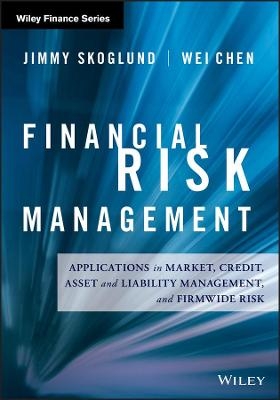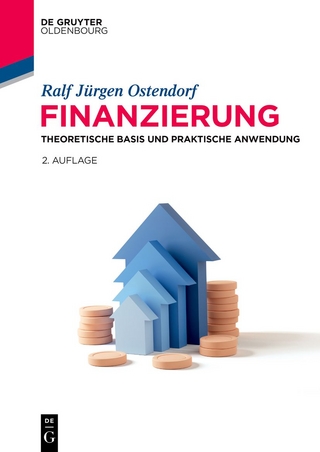
Financial Risk Management
John Wiley & Sons Inc (Verlag)
978-1-119-13551-7 (ISBN)
A global banking risk management guide geared toward the practitioner Financial Risk Management presents an in-depth look at banking risk on a global scale, including comprehensive examination of the U.S. Comprehensive Capital Analysis and Review, and the European Banking Authority stress tests. Written by the leaders of global banking risk products and management at SAS, this book provides the most up-to-date information and expert insight into real risk management. The discussion begins with an overview of methods for computing and managing a variety of risk, then moves into a review of the economic foundation of modern risk management and the growing importance of model risk management. Market risk, portfolio credit risk, counterparty credit risk, liquidity risk, profitability analysis, stress testing, and others are dissected and examined, arming you with the strategies you need to construct a robust risk management system. The book takes readers through a journey from basic market risk analysis to major recent advances in all financial risk disciplines seen in the banking industry. The quantitative methodologies are developed with ample business case discussions and examples illustrating how they are used in practice. Chapters devoted to firmwide risk and stress testing cross reference the different methodologies developed for the specific risk areas and explain how they work together at firmwide level. Since risk regulations have driven a lot of the recent practices, the book also relates to the current global regulations in the financial risk areas.
Risk management is one of the fastest growing segments of the banking industry, fueled by banks' fundamental intermediary role in the global economy and the industry's profit-driven increase in risk-seeking behavior. This book is the product of the authors' experience in developing and implementing risk analytics in banks around the globe, giving you a comprehensive, quantitative-oriented risk management guide specifically for the practitioner.
Compute and manage market, credit, asset, and liability risk
Perform macroeconomic stress testing and act on the results
Get up to date on regulatory practices and model risk management
Examine the structure and construction of financial risk systems
Delve into funds transfer pricing, profitability analysis, and more
Quantitative capability is increasing with lightning speed, both methodologically and technologically. Risk professionals must keep pace with the changes, and exploit every tool at their disposal. Financial Risk Management is the practitioner's guide to anticipating, mitigating, and preventing risk in the modern banking industry.
JIMMY SKOGLUND is principal product manager of global risk products at SAS. He has more than fifteen years of market experience developing and implementing risk methodo ogies, and his articles have appeared in such publications as the Journal of Risk, Journal of Banking and Finance, and Journal of Risk Management in Financial Institutions. Jimmy holds a PhD from the Stockholm Schooof Economics. WEI CHEN is director of stress testing solutions at SAS. He has more than fifteen years experience in risk analytics and technology in banking and insurance, and he is an associate editor of the Journal of Risk Model Validation. His publications have appeared in severa journals including Journal of Risk and Journal of Risk Model Validation. Wei holds a PhD from the University of Iowa.
Preface xi
Acknowledgments xvii
CHAPTER 1 Introduction 1
Banks and Risk Management 1
Evolution of Bank Capital Regulation 4
Creating Value from Risk Management 9
Financial Risk Systems 10
Risk Analytics 11
Risk Infrastructure 13
Risk Technology 15
Model Risk Management 17
PART ONE Market Risk
CHAPTER 2 Market Risk with the Normal Distribution 23
Linear Portfolios 24
Basic Model 24
Risk Measures 28
Risk Contributions 31
Estimating the Covariance Matrix of Risk Factors 39
Distribution of Risk Measures 40
Probabilistic Stress Testing 41
Quadratic Portfolios 43
Quadratic Portfolio Representation 44
Quadratic Portfolio Distribution 50
Calculation of Risk Measures for the Quadratic Portfolio 51
Simulation-Based Valuation 53
Example of Barrier Stock Options and Position Nonlinearity 54
Simulation from the Multivariate Normal Distribution 56
Risk Factor Dimension Reduction 60
Incorporating Model Estimation Error in the Simulation Scheme 65
Variance Reduction by Importance Sampling 66
Reducing Pricing Time 69
CHAPTER 3 Advanced Market Risk Analysis 75
Risk Measures, Risk Contributions, and Risk Information 75
VaR Interval Estimation 76
Coherent Measures of Risk 79
Simulation-Based Risk Contributions 80
Risk Information Measures 88
Risk Distortion Measures 93
Modeling the Stylized Facts of Financial Time Series 97
Univariate Time Series 97
Multivariate Time Series 110
Model Validation and Backtesting 122
A Multivariate Model of Risk Factor Returns 127
Time Scaling VaR and VaR with Trading 134
Time Aggregation of VaR with Constant Portfolios 134
Time Aggregation of VaR with Trading 135
Market Liquidity Risk 136
Closeout Time with No Liquidity Cost 137
A Note on General Market Illiquidity Models 140
Scenario Analysis and Stress Testing 142
Portfolio Sensitivity Analysis 143
Systematic Portfolio Stress Tests 143
Hypothetical Scenario from Reverse Stress Testing 147
Integration of Stress and Model Analysis 154
Portfolio Optimization 155
Portfolio Mean Risk Optimization 156
Cash Flow Replication 161
Developments in the Market Risk Internal Models Capital Regulation 165
PART TWO Credit Risk
CHAPTER 4 Portfolio Credit Risk 171
Issuer Credit Risk in Wholesale Exposures and Trading Book 174
Market Pricing of Corporate Bonds 174
Merton’s Structural Model for Corporate Bond Pricing 178
The Multivariate Merton Model 185
Applied Portfolio Migration and Default Risk Models 187
Economic Capital for a Portfolio of Traded Bonds 230
Credit Models for the Banking Book 235
The Binomial Loss Model 236
Credit Transition Score Models 242
Simulation of State Transitions and Markov Iteration 254
Mortgage Portfolio Risk Analysis: An Illustration 258
Point in Time and Through the Cycle Models—with Applications to Regulatory Stress Testing 277
An Economic Capital Model for Loan Portfolios 285
The Poisson Mixture Model and CreditRisk+ 289
Firmwide Portfolio Credit Risk and Credit Risk Dependence 296
Joint Codependency with Different Models 297
Indirect and Direct Codependency in Credit Risk Models 298
Credit Risk Stress Testing 299
Stress Testing with Multifactor Model 301
Stress Testing with Macroeconomic Credit Score Model 303
Features of New Generation Portfolio Credit Risk Models 309
Multi-Horizon Models for Banking Book 309
Modeling the Recovery Process for Banking Book Portfolios 310
Earnings and Loss Rather than Just Loss 311
Loan-Level Models 314
Granularity of Credit Factors 314
Hedging Credit Risk 315
Single-Name Credit Default Swaps 315
Credit Default Swaps on Portfolio Indices 320
Basket Credit Default Swaps 321
Regulatory Capital for Credit Risk 324
Regulatory Risk Components 326
Risk Mitigation and Regulatory Capital 327
Appendix 328
CHAPTER 5 Counterparty Credit Risk 333
Counterparty Pricing and Exposure 335
Market Standard Pricing Metrics 335
Assessment of Counterparty Default Probability 343
Exposure Simulation Framework for CVA 346
Market Correlations, Wrong-Way Risk, and Counterparty Pricing 360
Collateralized Exposures 364
CVA Risks 382
Portfolios of Derivatives 384
Netting 384
Marginal and Incremental Portfolio Trades 386
Recent Counterparty Credit Risk Developments 392
OIS Discounting for Derivatives 392
Advanced CVA Calculations and CVA Greeks 393
Funding Value Adjustments 394
Counterparty Credit Risk Regulation 395
Basel Counterparty Default Risk Charges 395
Enhanced Requirements on Counterparty Default Risk Charges 396
New Basel III Capital Requirements for Counterparty Credit Risk 397
Mitigating Regulatory Costs 399
PART THREE Asset and Liability Management
CHAPTER 6 Liquidity Risk Management with Cash Flow Models 403
Measurement of Liquidity Risk 407
Liquidity Exposure with General Liquidity Hedging Capacity 408
Liquidity Exposure with Cash Hedging Capacity 411
Components of the Liquidity Measure 412
Liquidity Exposure 414
Balance Sheet Cash Flows and Facilities 417
Off–Balance-Sheet Derivative Flows 427
Combining the Risk and Finance View 428
Hedging the Liquidity Exposure 428
Ranking-Based Liquidity Hedging Strategy 432
Optimal Liquidity Hedging Strategy 433
Structural Liquidity Planning 441
Mitigating Balance Sheet Vulnerability with Contractual Cash Flows 442
Choosing the Optimal Liquidity Hedging Portfolio 445
Components of the Liquidity Hedging Program 449
Cash Liquidity Risk and Liquidity Risk Measures 450
Cash Liquidity at Risk 450
Portfolio Cash Liquidity Exposure 451
Allocating Cash Liquidity Risk 453
Regulation for Liquidity Risk 455
Liquidity Coverage Ratio 455
Net Stable Funding Ratio 458
Regulatory Liquidity Monitoring Tools 459
CHAPTER 7 Funds Transfer Pricing and Profitability of Cash Flows 463
Basic Funds Transfer Pricing Concept 465
Example of FTP for a Mortgage and a Loan 466
Risk-Based Funds Transfer Pricing 468
Credit Risk and Capital 468
Embedded Optionality 470
Liquidity Risk 477
Funds Transfer Rate and Risk Adjusted Returns 481
Example of Mortgage Risk Adjusted Returns 481
Profitability Measures and Decompositions 482
Balance Sheet Breakdown with Funds Transfer Instruments 482
Application to Net Interest Income and Economic Value View 483
Banking Book Fair Value with Funds Transfer Rates 486
Example of Fair Values with FTP 486
A Note on the Scope of Funds Transfer Pricing 486
Regulation and Profitability Analysis 487
PART FOUR Firmwide Risk
CHAPTER 8 Firmwide Risk Aggregation 493
Correlated Aggregation and Firmwide Risk Levels 494
Linear Risk Aggregation 495
Copula Aggregation 497
Example of Copula Aggregation 497
Mixed Copula Aggregation 498
Example of Mixed Copula Aggregation 499
Capital Allocation in Risk Aggregation 501
Example of Mixed Copula Capital Allocation 502
Measuring Concentration and Diversification 503
Risk Aggregation and Regulation 503
CHAPTER 9 Firmwide Scenario Analysis and Stress Testing 507
Firmwide Scenario Model Approaches 509
Silo Approach 509
Firmwide Risk Model Approach 510
Multiple Model Approaches 512
Firmwide Risk Capital Measures 512
Risk Measures and Stress Scenarios 512
A Risk Reserve Approach—A Practical Illustration 514
Regulatory Stress Scenario Approach 516
Bank-Specific Approach: A Total Balance Sheet View 517
Bank-Specific Approach: More on Scenarios and Models 520
Systemic View: Financial System Analysis and Financial Contagion 523
The Future of Firmwide Stress Testing 524
References 527
Index 543
| Reihe/Serie | Wiley Finance Editions |
|---|---|
| Verlagsort | New York |
| Sprache | englisch |
| Maße | 191 x 262 mm |
| Gewicht | 1157 g |
| Themenwelt | Wirtschaft ► Betriebswirtschaft / Management ► Finanzierung |
| Wirtschaft ► Betriebswirtschaft / Management ► Rechnungswesen / Bilanzen | |
| ISBN-10 | 1-119-13551-6 / 1119135516 |
| ISBN-13 | 978-1-119-13551-7 / 9781119135517 |
| Zustand | Neuware |
| Haben Sie eine Frage zum Produkt? |
aus dem Bereich


